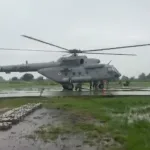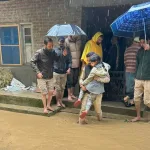Strategies for Containment and Resolution
The recent terrorist attacks in kathua district of Jammu and Kashmir (J&K) represent a significant challenge for the Indian government. These attacks, which resulted in the loss of soldiers, underscore a troubling shift in militant focus from the traditionally volatile Kashmir Valley to the relatively peaceful Jammu region. The implications of this shift are profound, necessitating a reevaluation of existing security strategies and the formulation of new approaches to effectively counter this evolving threat.
Jammu and Kashmir have long been a hotspot of militant activity, with the Kashmir Valley being the epicenter of insurgency for decades. However, in recent years, a noticeable shift has occurred, with militants increasingly targeting the Jammu region. This shift can be attributed to several factors, including increased security presence and intelligence operations in the Valley, which have made it more difficult for militants to operate there. Additionally, the strategic importance of Jammu as a gateway to the rest of India makes it an attractive target for militants seeking to disrupt normalcy and instill fear.
The attacks in Kathua and Jammu, which claimed the lives of several soldiers and civilians, highlight the growing boldness and sophistication of militant groups operating in the region. These incidents are not isolated; they are part of a broader pattern of escalating violence aimed at destabilizing the region and undermining public confidence in the government’s ability to maintain security.
The implications of these attacks are manifold. Firstly, they indicate a need for the government to adapt its security strategies to address the changing dynamics of militant activities. Secondly, they underscore the importance of community engagement and cooperation in countering terrorism. Finally, they highlight the necessity of addressing the underlying socio-economic issues that often fuel militancy.
The diverse and often difficult terrain of Jammu and Kashmir poses a significant challenge for security forces. The dense forests, mountainous regions, and porous borders with Pakistan provide militants with ample hiding spots and routes for infiltration.
Effective counter-terrorism operations rely heavily on accurate and timely intelligence. However, gathering intelligence in a region as complex as J&K is a formidable task. The presence of local sympathizers and the use of sophisticated communication technologies by militants further complicate this challenge.
Building and maintaining trust between security forces and local communities is crucial. In many cases, militants exploit local grievances and mistrust of authorities to gain support and cover. Winning the hearts and minds of the local population is therefore essential for long-term peace and stability.
The role of external actors, particularly Pakistan, in supporting and abetting militant activities in J&K cannot be overlooked. Cross-border terrorism remains a persistent threat, necessitating robust border security measures and international diplomatic efforts to hold accountable those who provide sanctuary to militants.
Strengthening intelligence capabilities is paramount. This includes investing in advanced surveillance technologies, enhancing human intelligence (HUMINT) networks, and fostering greater inter-agency coordination. Real-time intelligence sharing between various security agencies can significantly improve response times and operational effectiveness.
Engaging local communities through dialogue and development initiatives can help address grievances and build trust. Development programs that focus on education, employment, and infrastructure can provide alternative pathways for the youth, reducing their susceptibility to militant recruitment.
Given the role of cross-border infiltration in sustaining militancy, enhancing border security is crucial. This includes deploying advanced surveillance systems, increasing border patrols, and fortifying vulnerable points along the Line of Control (LoC) and the International Border (IB).
Addressing the ideological roots of militancy is essential for long-term peace. Counter-radicalization programs that promote moderate religious teachings, interfaith dialogue, and community resilience against extremist ideologies can help prevent the spread of radicalism.
Establishing and equipping specialized counter-terrorism units with advanced training and technology can improve the ability to conduct precise and effective operations against militants. These units should be capable of rapid deployment and equipped to handle a variety of scenarios.
Ensuring that the legal frameworks governing counter-terrorism are robust and up-to-date is essential. This includes stringent laws against terrorism financing, stringent punishments for those involved in militant activities, and effective mechanisms for prosecuting and detaining suspects.
The cornerstone of successful counter-terrorism efforts is intelligence-driven operations. This involves gathering actionable intelligence through surveillance, informants, and community cooperation, and then conducting precise raids to apprehend or neutralize militants.
Deploying advanced technologies such as drones, thermal imaging, and night-vision equipment can enhance the effectiveness of operations. These tools allow security forces to monitor and track militant movements in real-time, even in challenging terrain.
Developing a network of local informants who can provide real-time information about militant activities is crucial. This requires building trust within communities and ensuring the safety and anonymity of informants.
Effective coordination among various security agencies, including the army, police, and paramilitary forces, is essential for successful operations. Joint operations, regular communication, and shared intelligence can prevent duplication of efforts and ensure a unified approach.
Proactive measures, such as conducting regular security drills, maintaining high alert levels, and conducting thorough searches at checkpoints, can deter militant activities. Preemptive measures, such as disrupting militant financing networks and arresting key operatives before they can execute attacks, are equally important.
A sustainable solution to the issue of militancy in J&K requires meaningful political engagement. This includes addressing political grievances, fostering dialogue between different stakeholders, and ensuring that the voices of all communities are heard and respected.
Addressing the socio-economic disparities in the region is crucial for long-term peace. Investment in education, healthcare, infrastructure, and employment opportunities can reduce the appeal of militancy among the youth.
Empowering civil society organizations to play a role in peace building and conflict resolution can help bridge divides and promote social cohesion. These organizations can act as mediators, advocates, and providers of essential services.
Given the cross-border nature of the militancy issue, regional cooperation is essential. India must continue to engage with its neighbors, particularly Pakistan, to address the root causes of militancy and promote regional stability.
Garnering international support for counter-terrorism efforts and holding countries that support militancy accountable is crucial. Diplomatic efforts to isolate such states and pressure them to cease support for terrorist activities can be effective.
Conclusion
The recent terrorist attacks in Udhampur and other parts of Jammu and Kashmir represent a significant challenge for the Indian government. The shifting focus of militant activities to the Jammu region necessitates a comprehensive and adaptive approach to counter-terrorism. By enhancing intelligence operations, engaging with local communities, strengthening border security, and addressing the underlying socio-economic issues, the government can effectively contain and eventually eradicate the militant threat.
Long-term peace and stability in J&K require sustained political engagement, socio-economic development, and regional cooperation. Only through a multi-faceted and inclusive approach can the cycle of violence be broken and a lasting peace be achieved.
(Author is a columnist and can be reached at: [email protected])








